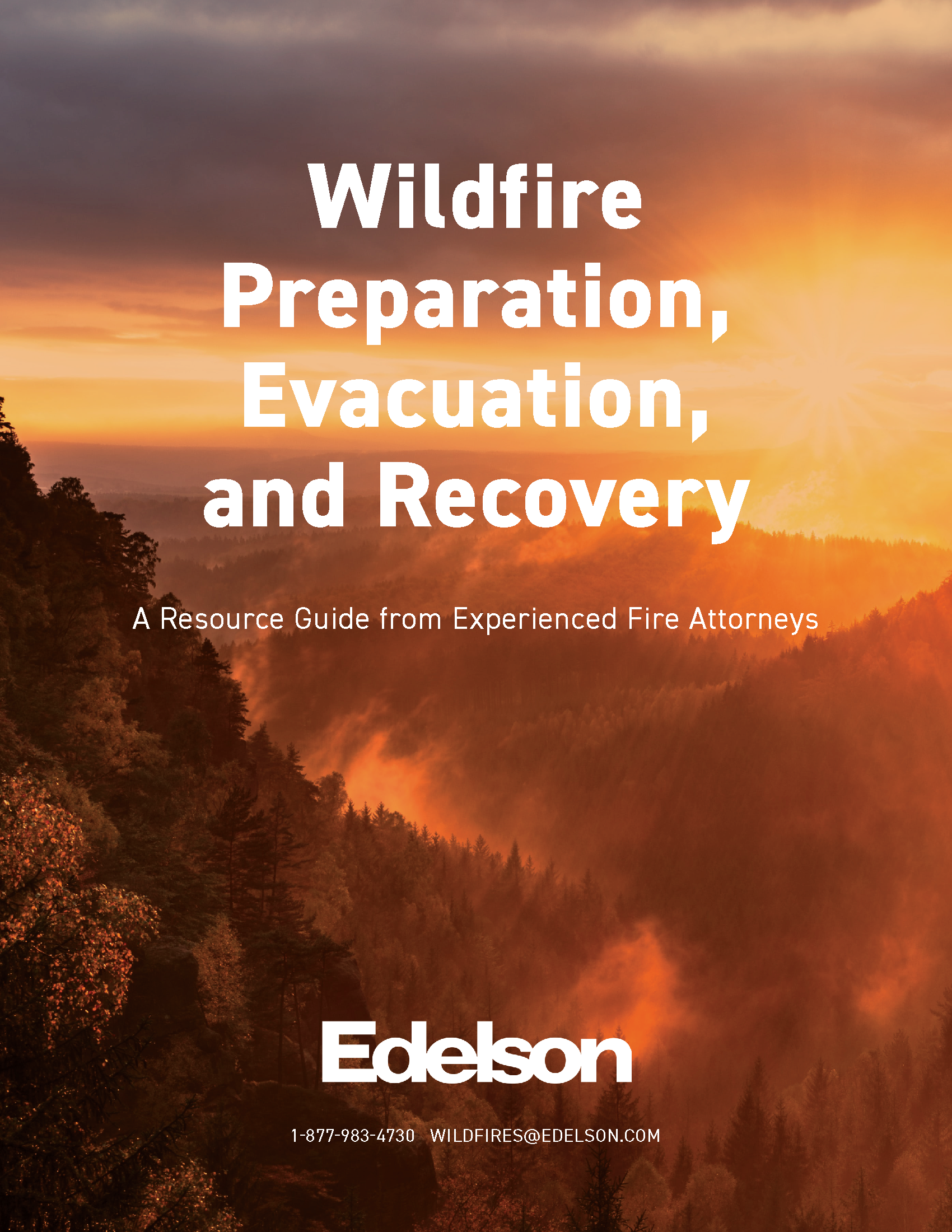Filing a legal claim related to a wildfire can be confusing and complicated.
Below are answers to common questions we receive.
1Why do I need a lawyer if I already have insurance?
Unfortunately, the majority of homeowners and renters are underinsured. That means wildfire victims can't always expect to receive the full value of their home and personal property when making an insurance claim.
Additionally, insurance rarely covers damages such as emotional harm, evacuation costs, and loss of income.
The wildfire attorneys at Edelson PC have successfully helped victims who are insured, underinsured, or not insured at all recover money for wildfire losses.
Additionally, insurance rarely covers damages such as emotional harm, evacuation costs, and loss of income.
The wildfire attorneys at Edelson PC have successfully helped victims who are insured, underinsured, or not insured at all recover money for wildfire losses.
2What if I don't have insurance?
The wildfire attorneys at Edelson PC will help homeowners, renters, and businesses who were victims of a wildfire potentially recover monetary damages—even if they were not insured at the time of the fire.
3I don't like lawsuits. Why do I need a lawyer?
Our attorneys are here to help make you whole. We can help you navigate the aftermath of a tragic wildfire. We will handle the litigation, document collection, paperwork, and filing of claims. We’ll advocate for your rights and work to maximize your recovery at every step in the process.
4I feel like I’ve lost everything. Where do I start?
Losing your home and personal property can be traumatic and overwhelming. There are a few steps you can take in order to help our attorneys evaluate your claim and help maximize your recovery.
- Make a list of your losses. Write down a list of all the property and possessions you lost to the fire. Large items like appliances, furniture and vehicles are a good place to start. List any items you lost in the fire - even family photographs and heirlooms. Many insurance policies require you to file a claim quickly and it is important to be thorough. This list may also prove useful when you’re asked to submit a proof of claim form.
- Take notes and gather the documentation you can. Document conversations with your insurance company when discussing your claim and keep a copy of your policy. Keep track of your medical bills if you or a loved one receives medical attention. Save receipts from hotel stays. Photographs which show the contents of your home can also be helpful for your claim.
- Contact an attorney early on in the process. An attorney can be your advocate to help ensure your rights are protected and your claim is complete.
5Who can be held responsible for a wildfire?
In the event that you or your business has suffered property damage or other losses in a fire, you may be able to recover these losses by filing a lawsuit against the utility company that caused the fire.
It is the company's legal duty to properly maintain its infrastructure and equipment. Specifically, utility companies have a responsibility to:
It is the company's legal duty to properly maintain its infrastructure and equipment. Specifically, utility companies have a responsibility to:
- Clear trees near power lines that could cause fires
- Avoid electrical arcing by separating transmission lines
- Remove brush and vegetation near electric and gas lines that could ignite a fire
- Employ power safety shut offs or de-energize the grid during adverse weather events
- Applying fireproof coatings to utility poles
6How much does it cost to hire a lawyer? I don't think I can afford to hire a team of attorneys at this point.
Our attorneys work on a contingency—meaning we do not get paid until we recover on your behalf. You will not be required to pay anything out of pocket to us. We also advance all costs of litigation including, among others, filing fees and hiring top tier experts.
7I lost a loved one in a fire. Do you handle wrongful death cases?
Yes. Our wildfire attorneys have experience litigating wrongful death cases, including in the California Camp Fire and other non-wildfire situations.
8What damages can I recover?
Fires can be emotionally devastating and can be challenging to get back on your feet.
In addition to the destruction it can cause to buildings and personal property, a fire also damages the mental well-being of a family. Fire victims may be able to recover damages for:
- Anxiety
- Ash and soot damage
- Bodily injuries and Burns
- Depression
- Electrical damage
- Emotional distress and anguish
- Loss of personal possessions
- Loss of trees and landscaping
- Loss of personal or business income
- Post-traumatic stress disorder (PTSD)
- Relocation expenses
- Roof collapse
- Smoke damage
- Structural damage
- Water and fire retardant damage
- Evacuation costs
9What if I rented my house?
Homeownership is not required to pursue damages as a result of a fire. Losing some or all of one's belongings in a fire generally results in significant personal property losses. It can be expensive to replace appliances, furniture, clothing and other valuable items we keep in our homes. Renters may also suffer non-economic damages due to the stress of the fire and displacement.
Download
Our Wildfire Guide
A Resource Guide from Experienced Fire Attorneys
We created this guide to provide information to wildfire victims and families who live in high fire risk areas. It contains information related to wildfire preparation, wildfire recovery, and wildfire lawsuits, generally. It also contains information about how Edelson PC may be able to help you.
-
Wildfire Preparation
-
Wildfire Evacuation
-
Wildfire Recovery

